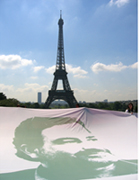 Reporters Without Borders today paid tribute to murdered Franco-Lebanese journalist Samir Kassir when 50 of its activists unfurled a giant Lebanese flag (150 sq. metres) bearing his portrait at Human Rights Plaza in Paris.
Reporters Without Borders today paid tribute to murdered Franco-Lebanese journalist Samir Kassir when 50 of its activists unfurled a giant Lebanese flag (150 sq. metres) bearing his portrait at Human Rights Plaza in Paris.
The worldwide press freedom organisation
As we said in Beirut last December, after Tueni was killed, we are disappointed by Council resolution 1644, which renews the commission’s mandate for six months but does not ask it to investigate other murders and political violence in Lebanon since October 2004,” he said.
Ménard appealed to the Lebanese government to say publicly it would quickly receive French investigating judge Jean-Louis Bruguière and the UN’s special rapporteur on promotion and protection of freedom of expression and opinion.Obeid spoke about Kassir’s dream of “a democratic Arab world” and an independent and secular Lebanon. “He died for Beirut, the city he loved, as an ultimate expression of his devotion to the Arab Nation and his awareness of its identity,” she said.
Tabet, a close friend of Kassir, said that “when a just person is murdered, all the world’s democracies are threatened.”
Bourdon reported on his efforts to speed up judge Bruguière’s visit to Lebanon, which he said should be in the next two months. “He is determined to go and we have high expectations.” He said Kassir’s widow and children wanted international arrest warrants to be issued in Paris.
Perrin said Kassir was “a friend and a support” for all foreign journalists who passed through Beirut, which “won’t be quite the same any more without him.”
Kassir’s widow, Gisèle Khoury, told Reporters Without Borders she was very concerned about the slowness of the French judiciary. “Time is not on our side. The pro-Syrian camp is making a comeback in Lebanese politics and this is giving the criminals hope. Judge Bruguière should have gone to Beirut as planned last December when the four generals suspected in the killing of Hariri were arrested.
“If I have to wait for the truth for over 20 years, as in the case of murdered French sociologist Michel Seurat, please tell me. Lebanese officials have been saying to me since last month they are ready to receive Bruguière, so why the delay? He must go to Beirut as soon as possible.”
Kassir was killed when a bomb planted in his car went off on 2 June last year outside his home in the Ashrafieh neighbourhood of eastern Beirut.
Kassir, a writer and historian, had been a columnist for the past 10 years for An-Nahar (“The Day” in Arabic). He was correspondent of the French-language international TV station TV5 and had written for many years for the French monthly Le Monde Diplomatique. He was also professor of political science at Beirut’s St. Joseph University and a founder-member of the opposition Democratic Left Movement. He took part in anti-Syrian protests in the spring of 2005.
He had been threatened and hounded for years because of his public stands and criticism of the “Lebanese police state.” State security agents harassed him in 2000 and his Lebanese passport was confiscated. He later said he had been constantly followed by Lebanese and Syrian intelligence agents. He then received protection from Hariri before he resigned as prime minister and was himself assassinated. Kassir’s last column, on 27 May, was headlined “Blunder after blunder” and criticised “continuing repression in Syria.”
Last year was a grim one for the Lebanese press, with two other journalists victims of bombings which, like Kassir’s, have still not been solved. Lebanese Broadcasting Corporation (LBC) star presenter May Chidiac was maimed by a car bomb on 25 September and An-Nahar publisher Gebran Tueni was killed by one on 12 December.



